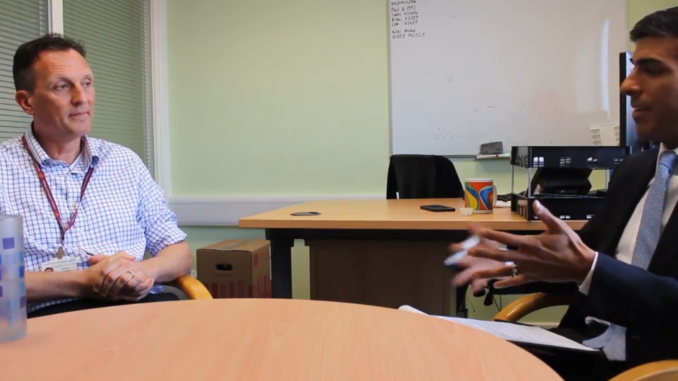
A senior doctor who has overseen controversial changes at the Friarage Hospital says he is proud of the new system.
Dr Adrian Clements, from the South Tees Hospitals NHS Foundation Trust, told Richmond MP Rishi Sunak that fewer than one in ten patients who previously used the Northallerton hospital’s A&E department were having to travel to James Cook in Middlesbough following the introduction of the mew model.
The trust’s deputy chief executive and Friarage medical director told the MP the change from an A&E to an urgent treatment centre had to happen for patient safety, with workforce challenges the only reason for the overhaul rather than financial challenges.
Dr Clements said there were not enough anaesthetists with critical care skills to continue running critical care services at the Friarage.
In the past anaesthetises with general skills could work in the A&E unit at the Friarage.
But the doctor said that new guidelines set down by the Royal College of Anaesthetists stipulate that special training is needed by doctors who work in critical care.
The doctor stressed that the changes had not affected patients who had suffered major trauma, heart attacks or strokes, who were already travelling to James Cook in Middlesbrough ahead of the recent changes and that there was “very clear evidence” that centralisation of services saved lives.
Patients who can no longer be treated at the Friarage, including sufferers of pneumonia or other infections, should not be affected by the longer distance in travel time to Middlesbrough, he added.
Dr Clements said that bringing consultants to the front door of the urgent care unit at the Friarage was an “enhanced service” on what was provided previously.
He said: “That is an enhanced service which we are going to be very proud of moving forward if we embed this model
“The urgent treatment centre is going to be to national specification reaching all the high standards and we do need to recruit nurse practitioners to deliver that.
“So I’m proud of those changes and I would see that many of those services have been enhanced.”
The doctor said the changes would cost the trust an extra £1.7m to deliver.
Dr Clements also said that the new model meant children with a wider range of health issues could attend the Friarage.
He added that the urgent care unit had seen a greater number of under-18s using the service as opposed to the previous A&E since the changes were implemented.
Dr Clements added: “We believe this is a sustainable model. We do need the model to be finalised. You can’t recruit to a model that’s in-doubt and we need to make appointments, especially of acute physicians, to support this model.
“We believe if the answer is finalised absolutely we can be delivering the care like we deliver today in the next ten years.”
Dr Clements reiterated his own support for the Northallerton hospital by saying that he sat on the trusts’ board and he would “look after the Friarage Hospital”.
“We will deliver as many services safety as we can at the Friarage Hospital for many years to come,” he added.
You can watch the interview in full here:
Friarage Hospital chief answers your questions about changes to services
The key questions about the Friarage Hospital and full answers from the key man responsible. Following my recent public meeting about the changes to emergency services at the Friarage Hospital, Northallerton, the hospital's medical director Dr Adrian Clements agreed to be interviewed about some of the issues that arose at that meeting and to answer further questions you have put to me about the hospital's future.
Posted by Rishi Sunak on Monday, 22 April 2019


Be the first to comment